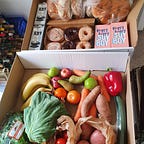Seaspiracy: eating fewer fish can help save the world
Seafood is bad for our health, our security and the planet
Ali and Lucy Tabrizi’s documentary Seaspiracy starts off as a film inspired by a love of the ocean and marine wildlife but becomes much more.
Released this week on Netflix, it soon becomes a revelation in how what we put on our plate is polluting and killing the planet.
There’s no such thing as sustainable or ‘dolphin-friendly’ fishing
The blue tick logo or a ‘dolphin friendly’ label on packaging doesn’t mean a thing. The Earth Island Institute, custodians of the ‘Dolphin Safe’ logo found on tuna products, were at pains to say it was impossible to regulate industrial fishing with few observers on deck to monitor the catch and the damage done to sealife and habitats.
The sustainability of ‘fish farms’ is dispelled as the film goes undercover at a Scottish farm where salmon swim in cages with their own waste, pollution and parasites. Those glistening healthy-looking pink fillets are often dyed using astaxanthin, a chemical colourant not as a result of their varied diet. In fact, farmed fish are often fed on ground fishmeal and antibiotics.
Without healthy seas, we’re doomed
Rather than being a major food source, marine life absorbs 93 per cent of carbon dioxide emissions, much more than forests do.
Algae, coral and vegetation are already struggling to absorb our pollution and fishing kills these marine habitats and delicate underwater ecosystems.
Industrial over-fishing has disturbed food chains, devastating fish and bird populations. A trawler net can swallow up to 13 jumbo jets so there’s no way boats can avoid killing endangered species.
Fishing pollutes more than oil and microplastics
The film is littered with ‘stop, rewind, play’ moments where you have to check that you just heard that correctly.
One such fact was that marine scientists an oil spill could have a net benefit to marine life due to the fact that a day of industrial fishing can destroy far more life than a three-month pollution event.
Fishing nets, buoys and floats are the biggest source of microplastic pollution yet none of the plastic-free campaigns or awareness groups talk about our consumption of fish. Are you aware of any?
Environmental groups are reluctant to speak out
Like the meat and dairy industries, big charities have done little or nothing to raise awareness of the impact that eating fish has on the planet.
The film points out funding links between businesses, charities and the regulatory system.
There is hope: groups such as Sea Shepherd support developing nations to tackle illegal fishing and disturb harmful industrial fishing. You can find out more and donate to their work. Do you know any others? Comment below.
Eating fish is bad for our health and security
Fish can contain traces of metal, microplastic and chemical pollution.
Its nutritional benefits such as Omega-3 are derived from plant life like algae, which are threatened by industrial fishing and the loss of endangered species. Plant-based supplements are widely available if you need to boost your intake.
The film also covers the human toll: tens of thousands of drowned fisherman, slavery in Thailand and the threat to hand-to-mouth fishing for survival in Liberia where piracy has been rife.
Incidentally, more cash is spent subsidising fishing than it would take to prevent hunger globally, which can fuel insecurity and extremism in improverished regions. Could it be that simple?
Your demand fuels the supply
As discussed with meat and dairy, what you put in your shopping basket affects the type of world we live in.
Regardless of reassuring labels, eating a tin or packet of fish is contributing to the destruction of our most precious natural resource.
In the same way that a burger or sausage disguises its origins, oceans feel far removed from battered cod at the chippy or a tin of tuna in the supermarket. We need to acknowledge the impact that our consumption of fish has on the shrinking wildlife we have left.
It can be done: scientists are confident we can re-wild ocean habitats if we regulate fishing.
There are more alternatives than ever: ‘fishless’ products and recipes are out there using seaweed or plant-based alternatives to mimic the flavour and texture of meat without the cost to the planet. Share your favourites below.
The film concludes with a call to action from oceanographer Sylvia Earle: “no-one can do everything but everyone can do something”.
